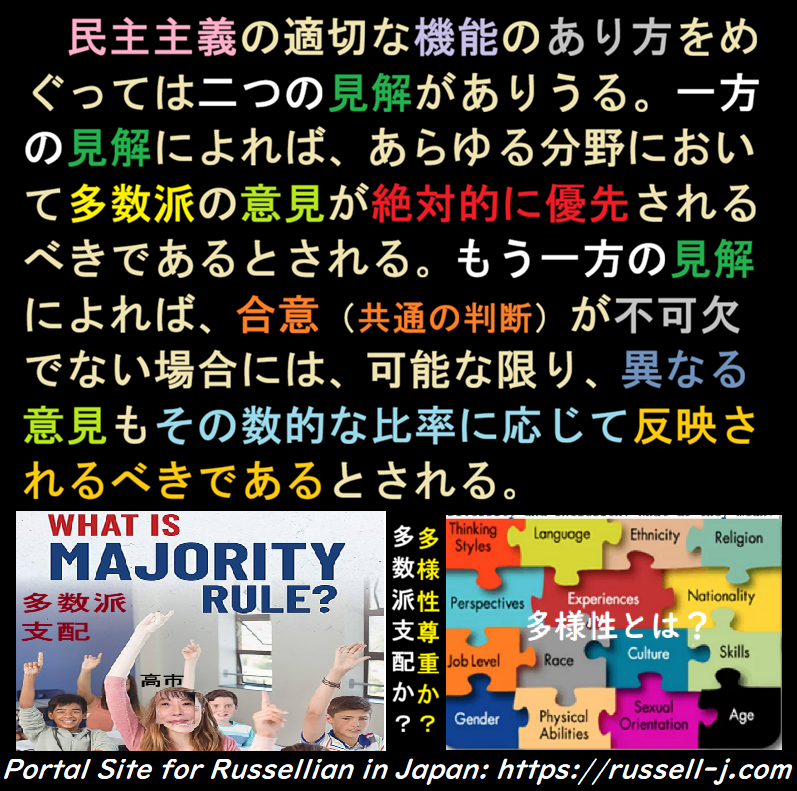
民主主義が適切に機能するために必要なこと
民主主義の適切な機能のあり方をめぐっては、二つの見解がありうる。一方の見解によれば、あらゆる分野において多数派の意見が絶対的に優先されるべきであるとされる。もう一方の見解によれば、合意(共通の判断)が不可欠でない場合には、可能な限り、異なる意見もその数的な比率に応じて反映されるべきであるとされる。
What is required for the proper functioning of democracy
There are two possible views as to the proper functioning of democracy. According to one view, the opinions of the majority should prevail absolutely in all fields. According to the other view, wherever a common decision is not necessary, different opinions should be represented, as nearly as possible, in proportion to their numerical frequency.
Source: Bertrand Russell: Freedom and the Colleges, 1940,
<多数決の支配か、それとも多様性の反映か?――ラッセルと考える「民主主義の適切な機能」>
先日(2026年2月8日投開票)の衆議院選挙において、「民主的な手続き」によって高市早苗氏が日本の総理大臣に再選されました。日本は大統領制ではなく議院内閣制を採っています。国会、とりわけ衆議院で議席の過半数を占める与党が首班として選んだ人物が総理大臣となります。したがって、自民党(198議席)、維新(34議席)、国民民主党(27議席)が連立を組めば、総議席数465の過半数を超える259議席を確保できるため、高市氏が総理大臣に就任することは制度上、何ら問題のないことでした。高市氏が当初口にした「自分が総理でよいかどうかを問う」ための選挙など、本来は必要なかったのです。
ところが、高市氏は「自分が総理にふさわしいかどうか国民の審判を仰ぐ」と唐突に宣言し、衆議院を冒頭解散しました。政権運営の成果を問うための解散であれば理解もできますが、十分な国会論戦も経ず、野党の追及や国民の判断材料を遮断したまま、わずか16日間の選挙期間で「数」による現状リセットを図った今回の手法は、民主主義のプロセスを軽視した暴挙と言わざるを得ません。
事実、解散直前には高市氏に関する不都合な事実が「週刊文春」などで報じられ始めていました。疑惑の追及を避けるために選挙という「数の力」を利用したのではないか――この疑念は今も拭えません。しかし、選挙の結果として自民党が圧倒的多数の議席を獲得したことで、当初は「理由なき解散」を批判していたマスコミや国民からも、その強引さを非難する声は急激に影を潜めてしまいました。「勝てば官軍」と言わんばかりに、選挙結果が過去のプロセスをすべて浄化してしまう現状は、民主主義のあり方として非常に危ういものを感じさせます。
定期的な選挙は、民主主義を機能させるために不可欠です。しかし、前回の衆院選からわずか1年半。今回の選挙に投じられた約800億円もの国費は、疑惑を不透明なままに押し流した今回の無理な解散に見合うものだったでしょうか。
民主主義を健全に機能させるには「社会における多様性」が不可欠です。しかし、米国のトランプ大統領や日本の高市総理には、「政治の分野における多様性」を重視しないどころか、異論を存在させること自体を軽視する傾向が見受けられます。
哲学者バートランド・ラッセルは、その著書『なぜ私はキリスト教徒ではないか』に収録されたエッセイ「Freedom and the Colleges」(1940年)において、私たちが混同してはならない「二種類の民主主義観」を次のように提示しています。
「民主主義の適切な機能のあり方をめぐっては、二つの見解があり得ます。一方の見解によれば、あらゆる分野において、多数派の意見が絶対的に優先されるべきであるとされます。もう一方の見解によれば、合意(共通の判断)が不可欠でない場合には、可能な限り、異なる意見もその数的な比率に応じて反映されるべきであるとされます。」(There are two possible views as to the proper functioning of democracy. According to one view, the opinions of the majority should prevail absolutely in all fields. According to the other view, wherever a common decision is not necessary, different opinions should be represented, as nearly as possible, in proportion to their numerical frequency.)高市氏が得た「圧倒的多数」は、行政を動かすための「合意(共通の判断)」形成には強力な武器となるでしょう。しかし、その数の力を盾にして異論を封じ込め、あらゆる分野を多数派の色に染め上げようとすれば、それはラッセルが危惧した「第一の見解」、すなわち多数派による専制へと足を踏み入れることに他なりません。
選挙に勝ったからといって、少数派の意見や不都合な批判を排除してよいわけではありません。民主主義の「適切な機能」とは何かを、私たちは今一度ラッセルの言葉に立ち返って問い直すべきではないでしょうか。
Majority Rule or the Reflection of Diversity? Rethinking the "Proper Functioning of Democracy" with Bertrand Russell
In the recent general election held on February 8, 2026, Sanae Takaichi was re-elected as the Prime Minister of Japan through "democratic procedures." Under Japan’s parliamentary cabinet system, the leader is elected by the Diet -- specifically the House of Representatives. With the Liberal Democratic Party (198 seats), Ishin (34), and the Democratic Party for the People (27) forming a coalition, they command 259 seats, exceeding the 233 required for a majority. Constitutionally, Ms. Takaichi's position was already secure; there was no inherent need for an election to "ask ask the public whether she should lead as Prime Minister.
However, in a sudden reversal, Ms. Takaichi declared she would "seek a mandate from the people" and dissolved the House of Representatives at the very start of the session. While a dissolution to test public sentiment after a period of governing is understandable, dissolving the Diet after bypassing parliamentary debate and allowing a mere 16-day campaign period is nothing short of an affront to the democratic process. It was a reckless move aimed at resetting the political landscape through the sheer force of numbers, without providing the public with sufficient information to judge her.
This is particularly troubling given that inconvenient reports regarding Ms. Takaichi were beginning to emerge in publications like Shukan Bunshun just before the dissolution. The suspicion that this was a "tactical dissolution" to evade accountability remains potent. Yet, as the LDP secured an overwhelming majority, the media and the public -- who initially decried the move as a "dissolution without cause"-- have largely fallen silent. There is a dangerous trend where electoral victory is treated as a form of "absolution," purifying any coercive methods used to achieve it.
Periodic elections are essential for democracy. But was the roughly 80 billion yen spent on this election -- held only a year and a half after the last one-- justified for a dissolution that effectively buried lingering scandals in a shroud of electoral numbers?
A healthy democracy requires "diversity within society." However, leaders like Donald Trump in the U.S. and Sanae Takaichi in Japan seem not only to ignore but to marginalize diversity within the political sphere, showing a marked disregard for the existence of dissenting voices.
In his essay "Freedom and the Colleges" (1940), found in Why I Am Not a Christian and Other Essays on Religion and Related Subjects, the philosopher Bertrand Russell presents two distinct views on democracy that we must not confuse:
"There are two possible views as to the proper functioning of democracy. According to one view, the opinions of the majority should prevail absolutely in all fields. According to the other view, wherever a common decision is not necessary, different opinions should be represented, as nearly as possible, in proportion to their numerical frequency."The "overwhelming majority" Ms. Takaichi secured may be a powerful tool for forming a "common decision" in administration. However, if that numerical strength is used as a shield to silence dissent and dye every facet of society in the colors of the majority, it steps into what Russell feared: the first view, or the tyranny of the majority.
Winning an election does not grant a mandate to eliminate minority opinions or inconvenient criticism. We must return to Russell's words and ask ourselves once more: what does it truly mean for democracy to "function properly"?
 ラッセル関係電子書籍一覧 |
 ラッセル関係電子書籍一覧
ラッセル関係電子書籍一覧
#バートランド・ラッセル #Bertrand_Russell